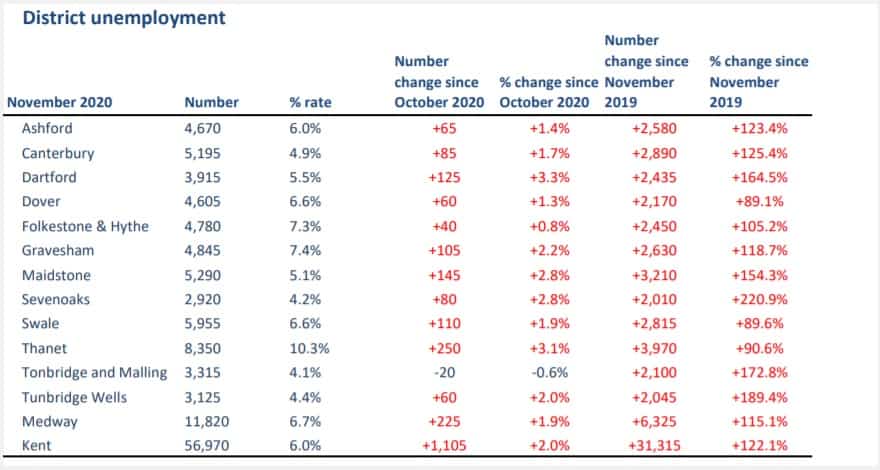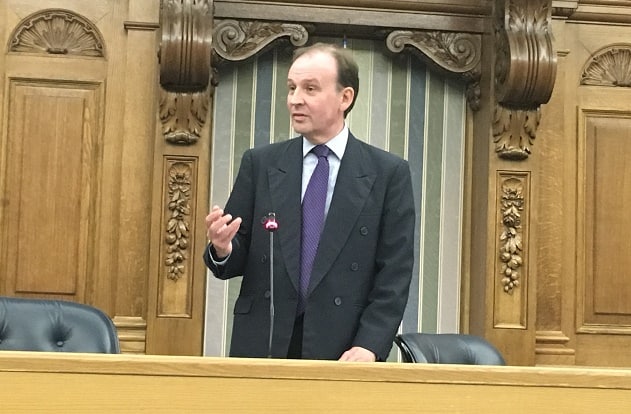
A Kent and Medway taskforce will tackle the spiralling levels of unemployment across the area due to the covid pandemic and resulting restrictions.
Between March and September, the claimant count in Kent and Medway rose by 119%, from around 33,000 to 72,000 (although it fell back slightly to 69,000 in October). This rate of increase was much sharper than the rise in unemployment after the financial crash, with the September claimant count rate at a level last seen in 1994.

In Thanet the unemployment rate for November was 10.3%, equating to 8,350 claimants, up 3% on the previous month and more than 90% compared to November 2019. The isle has the highest unemployment rate in the county.
Thanet also has the highest 18-24 year old unemployment rate in the South East at 16.9%, equating to 1,680 young people out of work.
A Kent and Medway Employment Plan says these figures would have been greater were it not for the job subsidy measures taken by the Government in the early stages of the pandemic.
Government subsidy
These included the Coronavirus Jobs Retention Scheme (CJRS), which enabled employers to furlough staff with up to 80% of pay contributed by Government; and the Self Employed Income Support Scheme (SEISS).
At the end of July, around 244,000 ‘employments’ had been furloughed in Kent and Medway, with a further 106,000 self-employed people supported through the SEISS to the end of September. The number of furloughed workers fell after restrictions were eased in the summer and the scheme has tapered down, although it was extended (at the maximum Government contribution level as the previous scheme) to coincide with the reimposition of national restrictions at the start of November.
Hardest hit

The most affected employment areas have been those most vulnerable to public health restrictions, especially hospitality and arts; entertainment and leisure; and retail and wholesale (as well as in construction).
This is reflected in employment, with firms in these sectors especially likely to take advantage of the furlough scheme and some large Kent businesses with exposure to the travel and tourism sector (such as P&O and Saga) announcing major redundancies.
The employment plan says lower-income workers will be disproportionately impacted by unemployment and temporary furlough arrangements, and that reduced entry-level jobs will disproportionately impact younger people joining the labour market.
Unemployment among people aged 18-24 increased by 121% in Kent and Medway between March and September. Young people are often disproportionately impacted by unemployment during recession, given the difficulty of entering a weak labour market without experience – and experience at the start of working life can leave ‘scarring’ effects on wages and career prospects lasting several years.
Older workers are more likely to face challenges associated with a lack of digital skills (especially where these have not been a requirement in previous employment), and the wider impacts of unemployment on household incomes and living standards are likely to be significant. Given the differential sectoral impacts of the crisis, some people may find it difficult to access new work in the same sector, so developing and applying transferable skills will be important.
There have also been redundancies at some major firms in Kent, including Dreamland, Winter Gardens/Theatre Royal, Genting Casino and Turner Contemporary.
The highest number of job vacancies were in nursing, care, driving, teaching and cleaning.
Employment Plan

The Employment Plan says: “The economic impact of the Covid-19 pandemic has been severe. Unemployment has risen rapidly since public health measures were first imposed in March 2020.
“Bold measures have been taken nationally to mitigate the effects of the crisis and there was some evidence of the unemployment rate plateauing in September and October. But the employment outlook is very challenging, especially in the light of a ‘second wave’ of the virus and associated restrictions.
“In the short term, we have seen significant labour market disruption, as some sectors have been restricted and general demand has weakened. The longer-term impacts are also likely to be significant, as the crisis accelerates structural shifts in the economy and employment demand lags behind a return to output growth.”
Political leaders and partners in education, business and employment support (including the Department for Work and Pensions) have now come together to establish the Kent and Medway Employment Task Force to help people looking for employment and those whose jobs may be lost as a result of the Covid pandemic.
The Kent and Medway Employment Task Force, chaired by Kent County Council Leader Roger Gough, brings together businesses, local government, schools, colleges, universities, the voluntary sector, careers service providers, the Department for Work and Pensions and two of the county’s MPs.
Task Force priorities
The Task Force is backing a range of measures introduced by Government to open up new job opportunities and to support jobseekers.
The Task Force’s Employment Plan sets out 4 key areas of action:
- Supporting young people into work, maximising benefits from the Government’s Kickstart scheme and ensuring that delivery partners in Kent and Medway work together; developing a network of hubs where young people facing barriers to employment can access work and skills advice; exploring new opportunities for work-based learning in the context of weaker industry demand; and increasing opportunities to access higher education.
- Supporting the existing workforce, especially older workers experiencing unemployment or at risk of redundancy. This includes coordination of the Adult Education Budget across Kent and Medway to increase access to digital skills, and access to careers advice and guidance as workers change sector and occupation.
- Responding to redundancy, to mitigate the impacts of redundancy programmes where they occur, by encouraging use of Jobcentre Plus’s Rapid Response Service and delivering advice o business via the Kent and Medway Growth Hub.
- Driving future demand, through the business support and investment measures proposed in the Kent and Medway Renewal and Resilience Plan, promoting local employment as firms expand and new projects come forward, and developing a more robust understanding of labour supply and demand as we plan for the future.
The Government’s Kickstart programme is already running, with the first places now being filled and some 1,000 new vacancies in the pipeline.
Work is underway to support new routes into employment, improve careers guidance and the sharing of the Apprenticeship Levy to create new training opportunities. Adult education will also be used.

KCC Leader and Task Force Chairman Roger Gough said: “I am delighted that public and private sectors have come together at this critical time to support jobs in the county, particularly for our young people. Our Employment Plan sets out our commitment to jobs at a time when many people will be anxious about the impact of the epidemic on their employers or the prospects that they may have for finding a job. We want to do all we can to keep Kent working.”

MP for Thanet North Sir Roger Gale continued: “With parts of Kent already experiencing high levels of job losses and with more expected as the furlough scheme comes to an end, the establishment of the Task Force and the actions we can take together will be critical in strengthening our support for all those seeking work.”
The Board will meet regularly during 2021.

